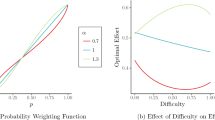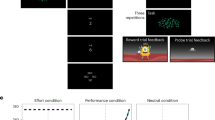Abstract
This paper critically assesses existing accounts of the nature of difficulty, finds them wanting, and proposes a new account. The concept of difficulty is routinely invoked in debates regarding degrees of moral responsibility, and the value of achievement. Until recently, however, there has not been any sustained attempt to provide an account of the nature of difficulty itself. This has changed with Gwen Bradford’s Achievement, which argues that difficulty is a matter of how much intense effort is expended. But while this account captures something important about the relationship between difficulty and achievement, it fails to account for the fact that part of what makes achievements great is that they are difficult in a moderately agent-neutral kind of way. Nor is this thought captured by any other extant account. I argue that to fill this gap we should think of (one kind of) difficulty in terms of low probability of success.
Similar content being viewed by others
Notes
See, for example, Grey (2000), Keller (2004), Bradford (2013). For important discussions of the value of achievements see Nozick (1974), Griffin (1986, 2008), Arneson (1999), Hurka (2001, 2011), Keller (2009), Fletcher (2013), Rice (2013). For important work on achievements done in the context of virtue epistemology, see Sosa (2007, 2009, 2010), Greco (2007, 2010), Pritchard (2010a, b), Carter and Pritchard (forthcoming).
Bradford (2015a).
Bradford (2015a).
Bradford (2015a, 27).
Bradford (2015a, 62–63).
As Bradford recognizes, there are, of course, likely to be other factors involved here as well (Bradford 2015a, 63). It might be, for example, that Messi’s achievements are more aesthetically pleasing than mine. Or that Messi is more competent than me in bringing about his achievements (though I suspect that I am as competent in scoring three rec-league goals a year as Messi is in scoring 40 in the Primera Division). In any case, it seems plausible that at least part of what makes Messi’s exploits greater achievements is that he does more difficult things.
We can stipulate that I exert as much effort playing soccer as Messi does. This stipulation strikes me as plausible given that it would be near physically impossible for me to play three full games within the span of a week as Messi routinely does.
There is, however, one exception to this egalitarianism. Bradford thinks that people differ in the maximum amount of effort they are capable of exerting. She says that ‘some people can try harder than others’ Bradford (2015a, 52). Since how hard someone tries measures partially how great their achievement is, people who can try harder have a leg up. So, this is where Bradford’s egalitarianism gives out. This picture raises two questions. First, is it plausible to think about exerting effort in this way, i.e. as something that we have more or less of an ability to do? (for discussion of this point see von Kriegstein 2017) Second, if that is the right way of thinking about effort, why does this particular ability allow people to achieve more difficult things than others, while all other abilities are denied that role?
Bradford (2015a, 31).
As discussed in the case of Messi above, it is likely that acquiring his extraordinary skills was itself a considerable achievement for Heifetz. But this is irrelevant for the point of contention here.
Pritchard (2010b, 68).
Bradford (2015a, 62).
See Bradford (2015a, 18).
To say otherwise is a bit like saying that if Jimmy, who hates chocolate, is forced to eat a snickers bar, there is pleasure “sans for” (it is not pleasure for Jimmy), because relative to the relevant comparison class (most children Jimmy's age) eating chocolate is pleasant.
For discussion of Bradford’s account of effort see von Kriegstein (2017).
Guerrero (2017, 203–204). This may also be Pritchard’s view, when he says that a highly skilled person may do something with ease and yet this be an achievement because it is not an “easy success” (Pritchard 2010b, 68–69). The more plausible interpretation, however, is that Pritchard thinks that such cases show that skill can be sufficient for achievement even in the absence of difficulty.
See also Dana Nelkin’s suggestion that “difficulty can be understood in at least two ways… [1] as requiring a great deal of effort… and [2] as requiring a great sacrifice of one’s interests” Nelkin (2016, 357).
Bradford (2015a, 37–38).
Bradford (2015a, 28).
Bradford (2015a, 37).
See, for example, the discussion of complexity as a measure of achievement in Hurka (1993).
Bradford (2015a, 29–39).
Cf. Bradford (2017, 184).
It is conceivable that there is a successful reduction to effort that employs a number of different forms of effort simultaneously. While this possibility is difficult to rule out, I take it that my discussion suffices to place the burden of proof with anyone willing to attempt such a reduction.
Bradford (2015a, 38).
Note also that if Bradford were serious about Heifetz playing the caprices without any effort, she would also have to say, implausibly, that for him the caprices are no more difficult than playing, say, the alphabet song.
Portmore (2007, 10–11).
Bradford (2015a, 47–51).
Guerrero (2017).
Nelkin (2016, 359).
I think that sacrifice is conceptually unrelated to difficulty. Cf. Cohen (2000, 218) endnote 39. Appearances to the contrary are due to the fact that it will often be difficult to make a sacrifice, to motivate someone to make a sacrifice, to deal with the loss of what was sacrificed, etc. Cf. McElwee (2015).
Bradford (2015a, 29).
Bradford (2015a, 29).
Cf. Bradford (2017, 184–185).
Guerrero (2016, 7) emphases added.
Guerrero (2017, 205).
Guerrero (2017, 205).
Guerrero (2017, 201).
Cf. McElwee (2015, 31).
Bradford comes close to explicitly making this argument in her PhD thesis. Bradford (2010, 42–43).
It’s worth noting that I would not regard it as a mistake to use the language of ‘difficulty’ for what I call ‘hardness’, and to say that moving boxes and furniture is difficult. I am simply avoiding this use of the term here in order to keep the two kinds of difficulty separate.
Compare Ronald Dworkin’s discussion of parameters and limitations—though Dworkin appears to be saying the opposite of what I am proposing here. Dworkin (1995, 253–260).
See, e.g., Pfeifer (2006).
The main problem with such a project would be a Bertrand style paradox. Given that there are uncountably many possible worlds, there are infinitely many possible ways of measuring a set of possible worlds. It is not easy to see how one could pick 'the right' one without resorting to probability – thus making the proposed analysis circular. See Hájek (2012, Sect. 3.1).
Cf. Pollock (1990, 72–73).
For helpful discussion and comments at various stages, I’m grateful to Kenneth Boyd, Gwen Bradford, Diana Heney, Thomas Hurka, Andreas T. Schmidt, Wayne Sumner, Sergio Tenenbaum, and Jonathan Weisberg.
References
Arneson, R. J. (1999). Human flourishing versus desire satisfaction. Social Philosophy and Policy, 16(1), 113–142.
Arpaly, N., & Schroeder, T. (2014). In praise of desire. New York: OUP.
Bradford, G. (2010). Achievements. Yale University Doctoral Thesis, New Haven.
Bradford, G. (2013). The value of achievements. Pacific Philosophical Quarterly, 94(2), 204–224.
Bradford, G. (2015a). Achievement. Oxford: OUP.
Bradford, G. (2015b). Knowledge, achievement, and manifestation. Erkenntnis, 80(1), 97–116.
Bradford, G. (2017). Hard to know. In J. W. Wieland & P. Robichaud (Eds.), Responsibility: The epistemic condition. Oxford: OUP.
Carter, J. A., & Pritchard, D. (forthcoming). The epistemology of cognitive enhancement. Journal of Medicine and Philosophy. https://philpapers.org/archive/CARTEO-58.pdf.
Coates, J., & Swenson, P. (2013). Reason-responsiveness and degrees of responsibility. Philosophical Studies, 165, 629–645.
Cohen, G. A. (2000). If you’re an egalitarian, how come you’re so rich?. Cambridge: Harvard University Press.
Dworkin, R. (1995). Foundations of liberal equality. In S. Darwall (Ed.), Equal freedom: Selected Tanner lectures of human values. Ann Arbor: University of Michigan Press.
Fletcher, G. (2013). A fresh start for the objective-list theory of well-being. Utilitas, 25(2), 206–220.
Greco, J. (2007). The nature of ability and the purpose of knowledge. Philosophical issues, 17(1), 57–69.
Greco, J. (2010). Achieving knowledge. Cambridge: Cambridge University Press.
Grey, W. (2000). Gasking’s proof. Analysis, 60(4), 368–370.
Griffin, J. (1986). Well-being: Its meaning, measurement and moral importance. Oxford: Clarendon Press.
Griffin, J. (2008). On human rights. Oxford: Oxford University Press.
Guerrero, A. (2016). Intellectual difficulty and moral responsibility: Pre-print. Retrieved at http://static1.1.sqspcdn.com/static/f/1011404/26891527/1456937056457/12Guerrero_Revised.pdf?token=5a6Ne5tRxVl8%2BfXXzwx43SmHOdY%3D.
Guerrero, A. (2017). Intellectual difficulty and moral responsibility. In J. W. Wieland & P. Robichaud (Eds.), Responsibility: The epistemic condition. Oxford: OUP.
Hájek, A. (2012). Interpretations of probability. In E. Zalta (Ed.) The Stanford encyclopedia of philosophy (winter 2012 edition). URL = <http://plato.stanford.edu/archives/win2012/entries/probability-interpret/>. Accessed 6 Nov 2017.
Hurka, T. (1993). Perfectionism. Oxford: Oxford University Press.
Hurka, T. (2001). Virtue, vice, and value. Oxford: Oxford University Press.
Hurka, T. (2011). The best things in life. Oxford: Oxford University Press.
Keller, S. (2004). Welfare and the achievement of goals. Philosophical Studies, 121, 27–41.
Keller, S. (2009). Welfare as success. Nous, 43, 656–683.
Lackey, J. (2007). Why we don’t deserve credit for everything we know. Synthese, 158, 345–361.
Markovits, J. (2010). Acting for the right reasons. Philosophical Review, 119(2), 201–242.
McElwee, B. (2015). What is demandingness? In Marcel van Ackeren & Michael Kühler (Eds.), The limits of moral obligation. New York: Routledge.
Nelkin, D. (2016). Difficulty and degrees of moral praiseworthiness and blameworthiness. Nous, 50(2), 356–378.
Nozick, R. (1974). Anarchy, State, and Utopia. New York: Basic Books.
Pfeifer, J. (2006). Laws of Nature. In J. Pfeifer & S. Sarkar (Eds.), The philosophy of science: An encyclopedia (Vol. I). New York: Routledge.
Pollock, J. (1990). Nomic probability and the foundations of induction. New York: Oxford University Press.
Portmore, D. (2007). Welfare, achievement, and Self-sacrifice. Journal of Ethics and Social Philosophy, 2(2), 1–28.
Pritchard, D. (2010a). Achievement, luck and value. Think, 9(25), 19–30.
Pritchard, D. (2010b). Knowledge and understanding. In D. Pritchard, A. Millar, & A. Haddock (Eds.), The nature and value of knowledge. Oxford: Oxford University Press.
Rice, C. (2013). Defending the Objective list theory of well-being. Ratio, 26(2), 196–211.
Sosa, E. (2007). A virtue epistemology: Apt belief and reflective knowledge (Vol. 1). Oxford: Oxford University Press.
Sosa, E. (2009). Reflective knowledge: Apt belief and reflective knowledge (Vol. 2). Oxford: Oxford University Press.
Sosa, E. (2010). Knowing full well. Princeton: Princeton University Press.
Von Kriegstein, H. (2017). Effort and achievement. Utilitas, 29(1), 27–51.
Author information
Authors and Affiliations
Corresponding author
Rights and permissions
About this article
Cite this article
von Kriegstein, H. On being difficult: towards an account of the nature of difficulty. Philos Stud 176, 45–64 (2019). https://doi.org/10.1007/s11098-017-1005-3
Published:
Issue Date:
DOI: https://doi.org/10.1007/s11098-017-1005-3




